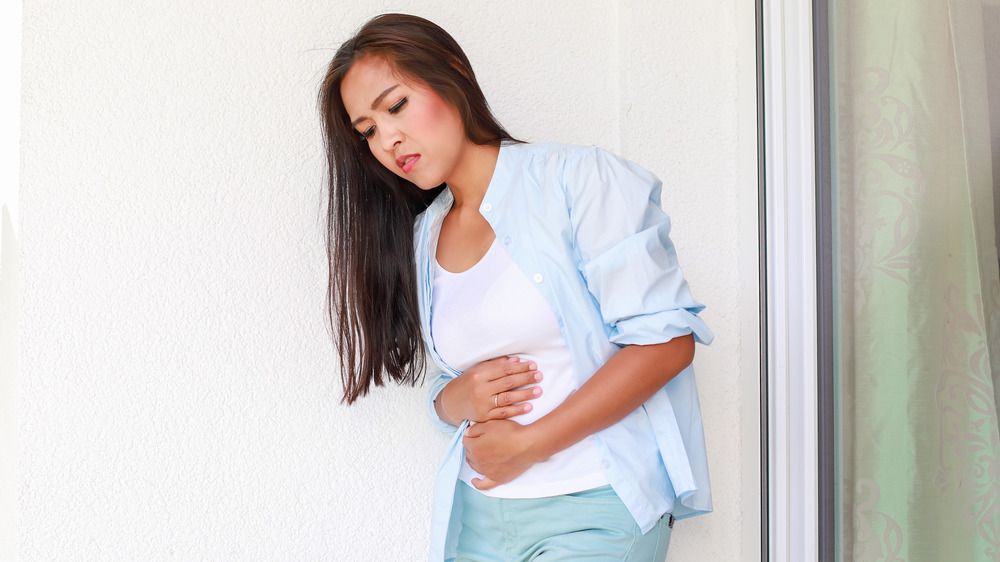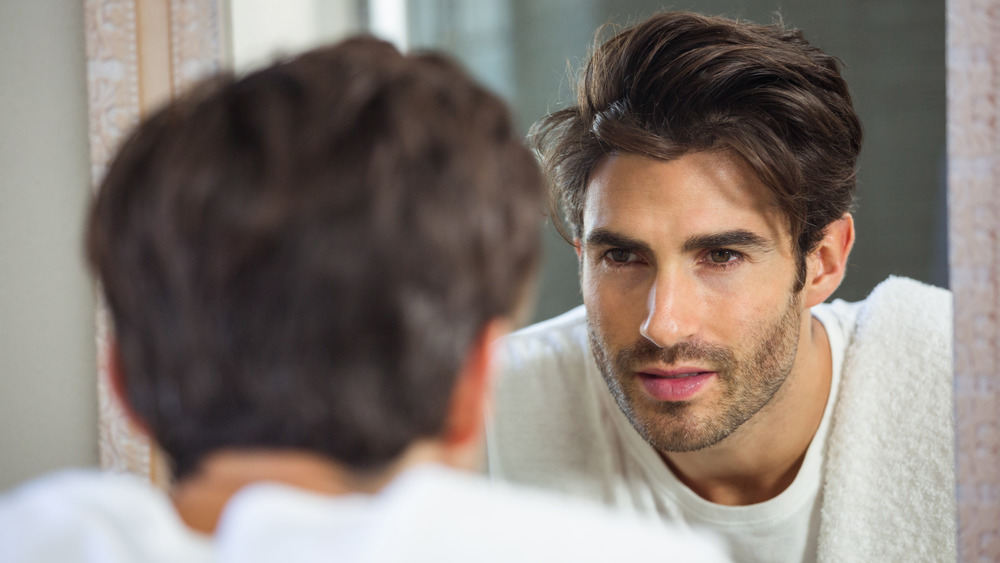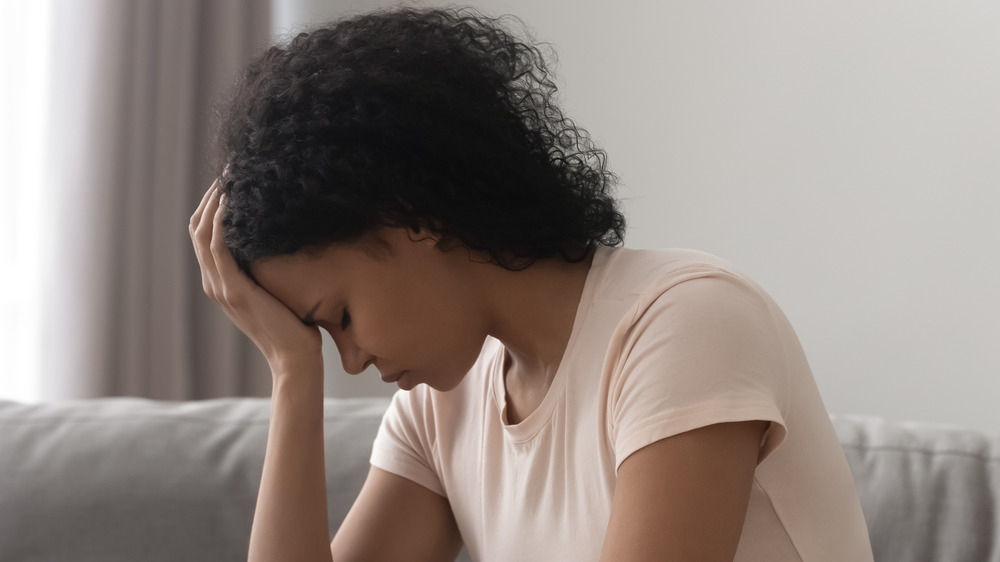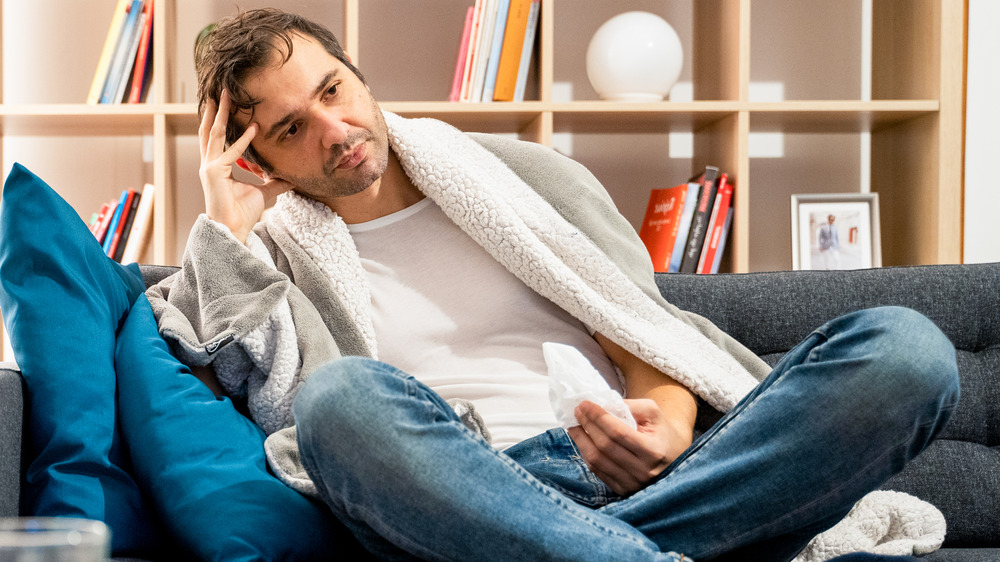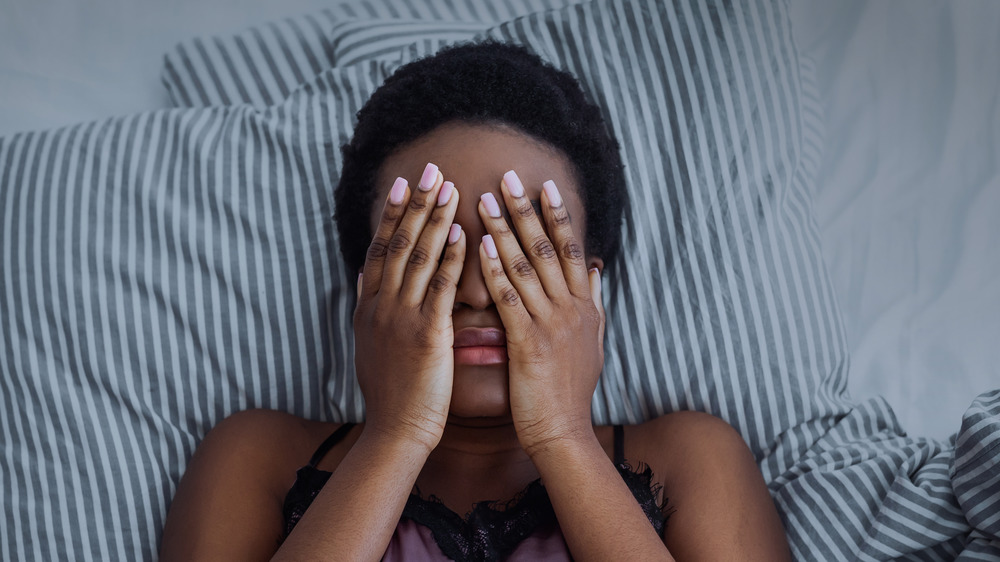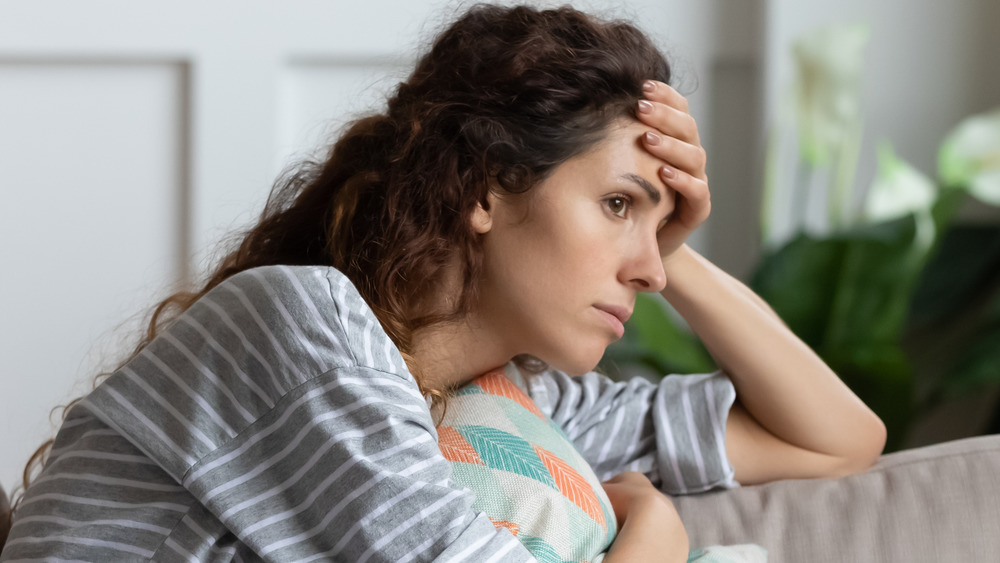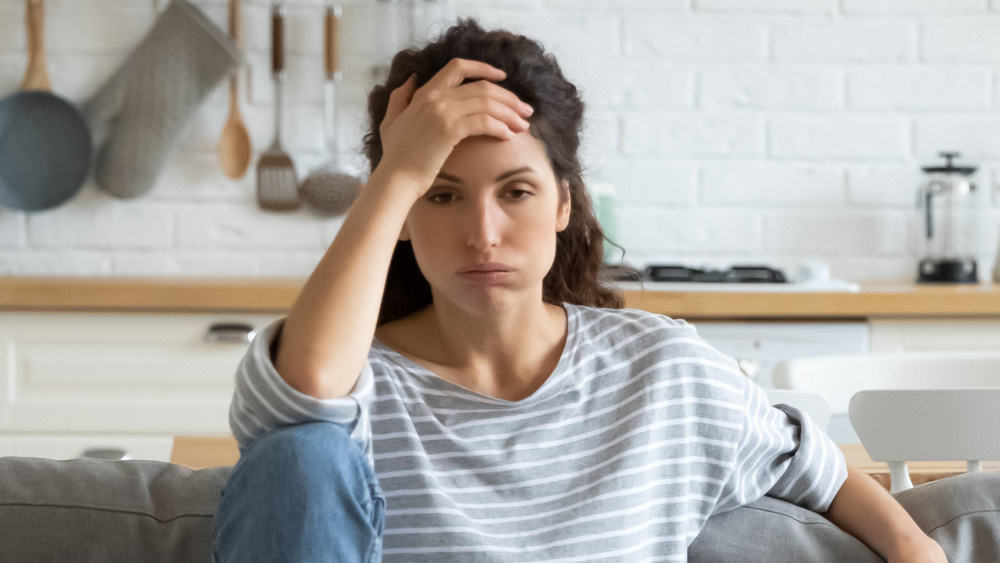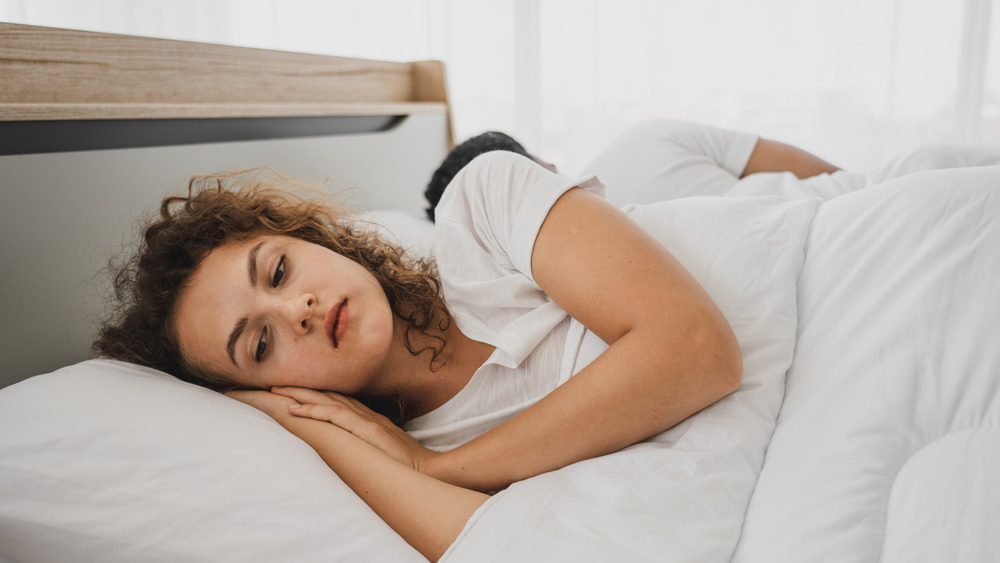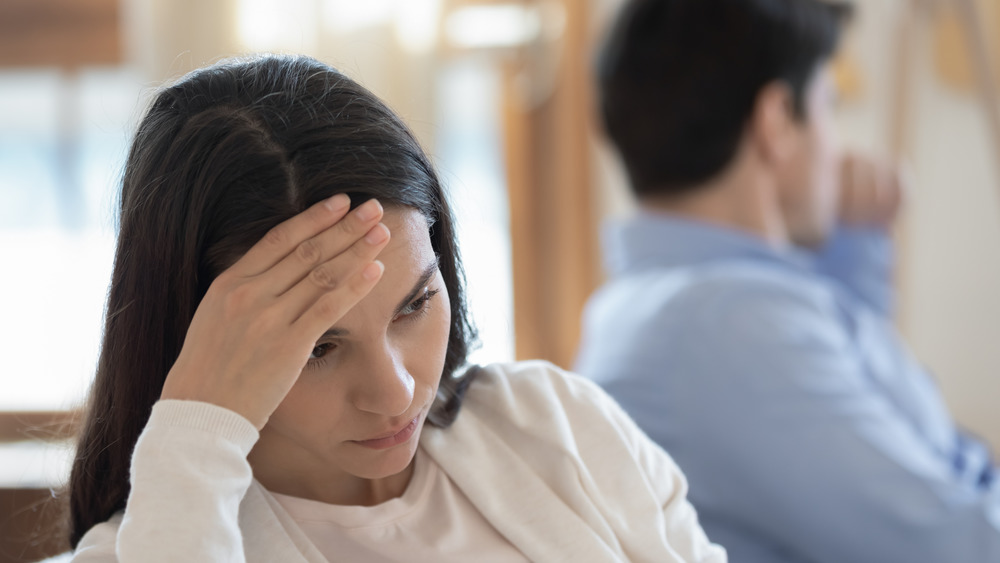When You Stop Having Sex, This Is What Happens To Your Body
Your reasons for not having sex regularly, or at all, may be plentiful. Perhaps you're practicing abstinence until marriage or until your relationship hits a milestone. Maybe you're wishing for a sexual partner but you haven't met the right person. It's possible you're in a relationship, but long distance — or social distancing — keeps you apart. And, it's also possible that you're in a relationship but conflict or tension has you in a dry spell.
First of all, know this: "There's nothing wrong with not having sex," Healthline confirmed. "Nothing will 'break' or 'get old' just because you aren't having sex." So if you are on a sexual hiatus, please try not to stress. Time without sexual activity can allow you to focus on self-care and self-love, build emotional intimacy without a physical connection, and/or give you the time to boost your fitness level, physical strength, and stamina. But if curiosity is occupying the space in your brain that those tasks could be filling? Read on to see what does happen to your body when you stop having sex.
Menstrual cramps might worsen when you stop having sex
More than half of women experience painful periods. If you're one of them, you probably hate them with a vengeance, even more than the nuisance of having a period in the first place. You should know, though, that there are things you can do to lessen the severity of your menstrual cramps — sex being one such way.
Why is that? One of the benefits of having orgasms is that they're known to help with cramping. According to Self, orgasms can relieve pain and tension. And Dr. Kecia Gaither, OB-GYN and director of perinatal services at NYC Health + Hospitals/Lincoln, told Health Digest, "If you're a woman who experiences cramping with menses, regular sexual encounters have been noted to decrease cramping. Orgasms release endorphins which relax the body. With lack of sex, women may experience an increase in cramping."
However, sex isn't the only way to get relief from those painful cramps. Increase endorphins in other ways — like exercising, eating chocolate, or drinking wine!
Vaginal walls can weaken and thin when you stop having sex
If you're lucky enough to experience an orgasm when you have sex, you're reaping multiple benefits, including an increased blood flow to the vaginal area. This is good news for aging women. Estrogen levels drop as women get older, which can cause the vaginal walls to become thinner and less lubricated.
Dr. Kecia Gaither, OB-GYN and director of perinatal services at NYC Health + Hospitals/Lincoln, told Health Digest, "Increased blood flow to the pelvic region, as occurs with sexual arousal, helps to keep the vagina and vulva regions lubricated, supple and elastic, by dousing the region with nutrient rich oxygenated blood."
On the contrary, a lack of intercourse, or the absence of the related stimulation and blood flow, diminishes this occurrence. "So when sex does occur," said Dr. Gaither, "it can be painful, due to the dryness, with an increased risk of vaginal tears due the thinned tissue."
Prostate health declines when you stop having sex
It's not only women who experience the consequences of an absent sex life. Men pay a physical price for sexual hiatuses, and the downside for them can be quite serious with their prostate health on the line.
Dr. Myles Spar, internist and chief medical officer of Vault Health, told Health Digest, "Studies have shown a lower risk of prostate cancer from regular ejaculation (at least 21 times a month versus men who ejaculate 4-7 times a month). Men on the lowest end of the scale of ejaculation frequency (0-3 times a month) also had an increased risk of dying from other medical problems."
This physiology might be one of the reasons why men have stronger sex drives than women. They think about it more and seek it out more, perhaps because their prostate health depends on it. With cancer on the table, this feels ominous. However, partnered sex isn't the only fix for this; solo sex works too.
When you stop having sex, your risk of UTIs decreases
It's not likely a surprise to learn that the risk of sexually transmitted diseases decreases when you stop having sex. But it's less intuitive that the risk of urinary tract infections also decreases without sexual activity. This is because intercourse can add to the spread of bacteria, as Dr. Lauren Streicher, OB-GYN and author of Sex Rx: Hormones, Health, and Your Best Sex Ever told Reader's Digest Best Health.
"The general motion [of sexual intercourse] can transfer bacteria from the bowel or vaginal cavity further into the urethra (aka the tube that urine flows out of)," Dr. Kyra Williams, an OB-GYN at Penn Medicine, told Prevention. So if you're someone who suffers from frequent UTIs, you'll be happy to know this is one beneficial consequence to a sexual hiatus that you can feel good about. You just might find yourself experiencing fewer of these infections, and subsequently avoiding the unpleasant and uncomfortable symptoms that accompany them.
Your immune response could weaken when you stop having sex
Move over vitamin C, there's another player in the immune support system that is taking center stage. According to WebMD, weekly sex boosts your immune system by raising your levels of a germ-fighting substance called immunoglobulin A, or IgA. "IgA is the first line of defence against colds and flu," Dr. Carl Charnetski, a professor at Wilkes University in Wilkes-Barre, Pennslvania, told New Scientist.
Unfortunately, if you are on a sexual hiatus, you might just be more susceptible to a cold or flu. According to Men's Health, people in the aforementioned study who had sex once or twice per week enjoyed a 30 percent boost in IgA compared with those who seldom or never had sex.
If you've stopped having sex for the foreseeable future, try not to worry. You can look to more traditional ways of boosting your immune system, like loading up on nutrient-rich foods.
Aches and pains might seem more prevalent when you stop having sex
Ever have one of those days when your back started hurting the moment you woke up? It's hard to think about anything else when your muscles are misbehaving and causing you grief. And if you're in the midst of a sexual drought, you may find those typical aches and pains to be worse than usual.
"Sex is a natural pain killer," Melissa Gentry, sex, relationship, and intimacy coach and CEO of Healing the Love, told Health Digest. "Sex increases our serotonin and dopamine (feel-good neurotransmitters responsible for feelings of pleasure and satisfaction). During sex, we release endorphins (feel-good hormones that activate the opioid receptors in the brain) that can help us reduce pain and stress." Gentry continued, saying, "Endorphins can also be referred to as the 'body's natural morphine,' due to their natural pain-killing effects."
Of course, there are ways other than sex to boost your endorphins. Exercise, for one, can definitely help alleviate some aches and pains. And you can always look to supplement your diet with some natural pain-relieving remedies.
You may not sleep as well when you stop having sex
There's a strong connection between sex and sleep. Oftentimes, fatigue is a big hurdle in a relationship, hindering one's libido and overall interest in sex. And at least one study showed that the longer an individual sleeps, the greater their sexual desire is the next day. But the relationship between sex and sleep isn't a one-way street. Sex can actually help you sleep, and it can improve the quality of sleep you get.
According to The Independent, lovemaking has a "sedative effect." So if you're used to that level of rest, you might be missing it once you stop having sex, as your body is no longer getting the endorphins that led to deep rest and relaxation. If you are tossing and turning more than usual, you should try to avoid caffeine, nicotine or alcohol close to bedtime. You should also avoid exercising late at night and consider meditation to ease you into sleep, helping you get the rest you need. Worried that no matter what you do you won't be able to fall asleep? No worries, there are apps for that!
When you stop having sex, your energy and motivation may drop
It may sleep like everyone has lost a bit of "get up and go" these days. But could your lack of energy and motivation actually stem from a lack of sex? It sure could, especially if there's been a change from your usual level of sexual activity. Those who refrain from sex may experience sluggishness. As sex provides mood-elevating endorphins, it's no wonder people might feel sluggish and less energetic.
Perhaps the fix is to up that sexual activity level, adding a little morning glory to your routine. Dr. Eva Cwynar, a California-based endocrinologist and metabolic specialist, told Forbes, "If [women] start their day with [sex], from a hormonal perspective, they'll be much more energetic. It invigorates people."
Looking for a different fix? Making changes to your diet is a great way to boost your energy and motivation. Look for healthy, whole foods and go easy on the carbs. You might find that, if you eat right, you'll be motivated to get out there and exercise — which is yet another plus for your body.
Your cardiovascular health could decline when you stop having sex
"Physically, sex can help us stay in shape, burn calories, and lower blood pressure," Melissa Gentry, sex, relationship, and intimacy coach and CEO of Healing the Love told Health Digest. While sex can vary from light cardiovascular exercise to an intense sweat session, having sex burns 5 calories per minute on average.
"This cardiovascular exercise can help keep both your physical and emotional heart healthy," said Gentry. "Research studies show that people who have sex only once a month or less have heart disease complications more often than people that have sex twice a week or more." In fact, a 2019 study in the American Journal of Medicine found that people were more likely to survive a heart attack if they had sex at least once a week.
So what is someone in a sexual drought to do, when obviously that particular boost isn't available to them? You can up your cardiovascular health through diet and a cardio fitness plan. You are capable of getting your blood pumping one way or another.
When you stop having sex, your anxiety might increase
"If sex is what you want and not having it feels like something is missing, and if you define sex by partnered erotic activity ..., then stopping can result in decreased feeling of connection and intimacy for those in relationships, which can in turn cause feelings of ... anxiety," Dr. Jill McDevitt, sexologist, sexuality educator, sexual wellness coach explained to Health Digest. Additionally, Dr. McDevitt revealed, "For single folks who are involuntarily not having sex, there can be feelings of distress, rejection, anger, and so forth." This can also lead to increased anxiety.
If you find yourself wishing things were different — whether that means wanting a more active sex life or a healthier sexual relationship with your partner — know that your feelings are natural and normal. If you find your anxiety has become difficult to manage, consider speaking to your healthcare professional.
You may be more stressed out when you stop having sex
A healthy sex life can help with both your physical and emotional health. Therefore, Melissa Gentry, sex, relationship, and intimacy coach and CEO of Healing the Love told Health Digest that not having sex can cause someone to have higher stress levels, which can lead to feeling "up tight" or on edge.
"When we have sex there are many benefits to our neuropsychological health," explained Gentry. For one, during sexual arousal and intercourse our bodies release oxytocin, the so-called love hormone. Additionally, sex can help our bodies regulate levels of cortisol, the stress hormone. "By lowering our stress and increasing our feel good hormones," said Gentry, "we create a recipe for a calm mind."
It stands to reason that without an active sex life, our minds might race and we might feel more stressed than usual. There are things you can do to help mitigate the feelings of such anxiety — exercise, meditate, et cetera — but if your anxiety feels out of control, consider consulting a healthcare professional. You're worth it.
You may start becoming forgetful when you stop having sex
There's no denying the mind-body connection. Interestingly, one animal study have shown that sex can improve brain function and grow brain cells. And when a withdrawal period was introduced, the cognitive improvements were lost. Good thing this was a study among middle-aged rats, right? "This goes under the heading of 'interesting preliminary research', but proves nothing," Dr. Lauren Streicher, OB-GYN and author of Sex Rx: Hormones, Health, and Your Best Sex Ever, told Business Insider. However, other research has shown that people who have sex more often have better recall and improved memory.
Fortunately there are things you can do to boost cognitive function if you are in a sexual dry spell. Consider playing brain training games or meditate and aim to get enough sleep (via Psychology Today). Better yet, do them all. "Don't just focus on one new thing, either," Dr. Brody-Magid, clinical director of the Memory Disorders Assessment Clinic at Harvard-affiliated McLean Hospital, told Harvard Men's Health Watch. "It's just like exercising your muscles. If you only do biceps curls, your arms will get stronger, but your legs won't."
Resuming sex after stopping for a while may be challenging
Unless you've taken a solid vow of celibacy, it's likely that there will come a time when you'll want to and/or be able to start having sex again. However, it's possible that your time away from sex has had an impact on your sex drive. Dr. Christine Greves, a board-certified OB-GYN based in Florida, told Health that your libido may be lower in the absence of sex. However, this issue can reverse itself. After you've gotten back in the saddle, so to speak, your sex drive will likely return to normal, the doctor explained.
However, going periods of time without sex can cause natural lubrication problems for women. Vaginal dryness, a common symptom of menopause, is worsened by vaginal atrophy. This can make sex painful and unenjoyable. For relief, buy a lubricant (or coconut oil if you prefer a natural yet effective option).
For men, sexual inactivity has been associated with erectile dysfunction (ED). Nevertheless, "it's premature to conclude that frequent sex ... can help men stave off ED, [urologists] say" (via WebMD).
Your relationship's health will be compromised if you stop having sex
When you stop having sex, you may notice physical, mental, and emotional changes to your own body, but you may not be the only one affected. A sexual hiatus can also take a toll on your partnership, if you're in one. And it's all connected: The health of one's relationship can affect one's physical health.
Amanda Gesselman, a social psychologist and research scientist at The Kinsey Institute, told Vice, "It's not surprising that when our partner's desire for sex begins to decline —maybe because they're stressed, depressed, or tired, or because the frequency of sex tends to decrease as relationships progress — we interpret that decline as a sign that something is wrong."
So how can you build back up to a healthy sexual relationship in a way that is authentic and without pressure — or ensure you don't go down an unhealthy path if something else is in the way of a healthy sex life? "If you've stopped vaginally penetrative sex, Dr. Jill McDevitt, sexologist, sexuality educator, sexual wellness coach explained to Health Digest, "kissing, cuddling, and caressing with a long-term partner can keep the connection going."


